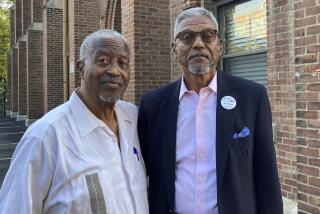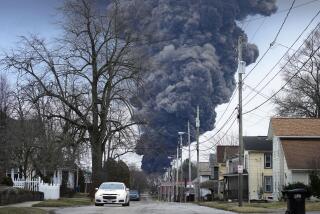Union Carbide Liable for Asbestos Illnesses
- Share via
Dow Chemical Co.’s Union Carbide was found liable Thursday for thousands of asbestos-related illnesses and deaths in a West Virginia trial. It now must face a series of hearings to assess whether damages are warranted in individual cases, opening the door to millions of dollars in potential claims.
The trial in Charleston was originally to have pitted more than 8,000 plaintiffs against 250 corporations, including Exxon Mobil Corp. and Honeywell International Inc. But after failing in a last-ditch bid to get the U.S. Supreme Court to block the massive case, most defendants settled or had claims against them dismissed.
The trial went forward late last month against Union Carbide alone on behalf of more than 2,000 plaintiffs. Some alleged they had been exposed to asbestos in insulation used in Carbide’s chemical plants; others said they were exposed to Carbide products, such as joint compound, that included calidria, a unique form of the mineral fiber.
Union Carbide mined calidria in King City, Calif., its only source in the world, until 1985 and sold it for use in a variety of products. Carbide maintained that the calidria asbestos it sold was safe and that it provided “gold-standard” protection for workers and contractors in its plants, said spokesman John Musser.
He said the company was pleased that the jury determined punitive damages were not warranted in the product cases and that the potential for punitive damages was limited to three times compensation in the plant exposure cases. Still, Musser said, the company is considering an appeal.
“We don’t feel that we had the opportunity to put forward our entire case” because certain witnesses were barred from testifying, he said.
After a day and a half of deliberations, the six jurors unanimously agreed that the chemical maker should compensate victims for injuries related to asbestos exposure in its plants from 1945 to 1980 and to products containing calidria from 1964 to 1972.
A series of smaller trials to decide individual damages is expected to begin early next year. Plaintiffs with similar allegations and injuries are expected to be grouped together, and each plaintiff will have to demonstrate an asbestos-related injury and identify the source and date of exposure.
The alleged injuries range from asbestosis, a disabling scarring of the lungs, to lung cancer and mesothelioma, a fatal malignancy of the lining of the chest or abdomen.
Plaintiffs brought in experts who testified calidria was not safe and workers who described the hazardous conditions created by frequent insulation work inside Union Carbide chemical plants, said Paul Hulsey, a lawyer representing tradesmen and other contractors.
“Contractors were exposed to the same dust as employees,” he said. “They had men cutting and shoveling up asbestos all day long....They had no respirators. In some cases they didn’t even know it was asbestos. One man testified he had been using asbestos for two years when they told him it wasn’t.”
Dow Chemical’s stock on Thursday fell $2.57, or 9.3%, to $24.97 on the New York Stock Exchange.
The company’s exposure is not limited to the West Virginia cases. Dow reported to securities regulators in August that through June 30, Union Carbide had received $298 million in asbestos-related claims, including cases that were settled but unpaid, and had $285 million in related insurance.
The question of calidria’s safety has come up only recently in a handful of cases. Union Carbide was acquitted in two trials, one in Texas and one in New York, where products containing calidria were at issue, Musser said.
The first verdict against the company in a calidria case came in September in San Francisco. In that case, which also included other defendants, a shipbuilder dying of mesothelioma was awarded $4.2 million.
Dow’s $1-million share reflected jurors’ assessment of the culpability of its products relative to the other sources of asbestos he was exposed to in the shipyard. Dow is appealing that verdict.
More to Read
Inside the business of entertainment
The Wide Shot brings you news, analysis and insights on everything from streaming wars to production — and what it all means for the future.
You may occasionally receive promotional content from the Los Angeles Times.











